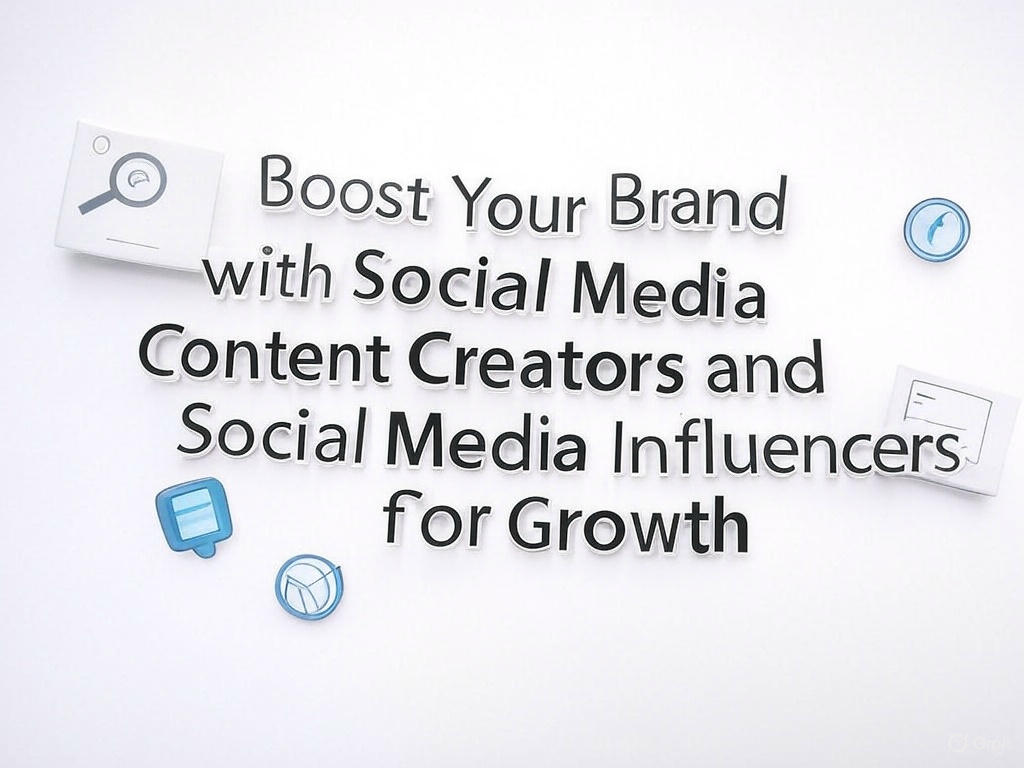Are you looking for a way to generate buzz, build brand awareness, and connect with your target audience on a deeper level? It’s time to harness the power of influencer marketing. By partnering with social media content creators who genuinely resonate with your brand’s message, you can tap into highly engaged online communities, spark authentic engagement, and ultimately drive more conversions. Whether you’re a bustling startup eager to make your mark or an established company ready to amplify your reach, strategic influencer partnerships can revolutionize your social media marketing efforts, delivering immediate results and long-term brand loyalty.
In this guide, we’ll explore how to identify and collaborate with the right content creators, set clear objectives for influencer marketing campaigns, measure the impact on your marketing ROI, and form profitable, long-term relationships. We’ll also cover the essential tools, tactics, and best practices that ensure your marketing strategy is practical and future-proof. Read on to discover how aligning with micro-influencers, thought leaders, and other digital marketing partners can catapult your brand into new realms of credibility and growth.

The Power of Influencer Marketing & Content Creators
In today’s digital age, consumer attention is more complicated to capture than ever. Traditional ads often struggle to stand out in a crowded market, making influencer marketing a natural fit for brands seeking a more authentic approach. An influencer or content creator acts as a relatable spokesperson, leveraging a dedicated community to amplify your message.
• Social Proof: Viewers trust influencers they follow, seeing them as friends or role models. This sense of familiarity translates into stronger brand credibility.
• Reach & Niche Targeting: From micro-influencers with devoted Instagram followers to YouTube vloggers specializing in specific genres, working with smaller or niche online communities can be as impactful as major celebrity endorsements.
• Human Touch: Because content creators craft stories that reflect their personal experiences, the result is an authentic engagement rarely achieved through traditional ads.
Whether you are new to digital marketing or a seasoned pro, collaborating with the right influencers can help your company stand out and forge genuine customer relationships.
Identifying & Choosing the Right Social Media Influencers for Your Brand
Selecting the perfect influencer can feel like both an art and a science. To find a partner whose vibe complements your brand identity, consider the following criteria:
- Audience Alignment
- Examine the influencer’s audience demographics, including age, location, and interests. To maximize relevance, aim for an overlap with your target audience.
- Content Style and Tone
- Evaluate whether the content creator’s style aligns with your brand’s values and aesthetics. For instance, if you’re a tech brand, you might seek influencers who focus on innovation or product reviews.
- Engagement Rate
- Look at likes, comments, shares, and other interactive signals. An influencer with 10,000 followers and a 10% engagement rate might be more valuable than someone with 100,000 followers but minimal interaction.
- Authenticity Factor
- Seek out content creators who maintain trust with their followers through genuine storytelling. Authenticity fosters stronger brand loyalty and higher conversion rates.
Aligning these aspects with your marketing strategy ensures you partner with influencers who can effectively convey your brand message.
Setting Clear Objectives for Influencer Marketing Success
Before initiating contact with any content creator, defining what success looks like is crucial. While you may have multiple secondary goals, focus on the primary objectives for each influencer collaboration:
- Brand Awareness
- When introducing new products or services, your main aim may be broad visibility. Selecting influencers with a larger following can help you gain significant exposure.
- Lead Generation
- For bottom-of-the-funnel tactics, incorporate trackable links, promo codes, or unique landing pages to measure how an influencer drives website traffic and sales.
- Reputation Management
- Align with influencers who exude trust and authority. Their endorsements can alleviate negative perceptions and bolster brand credibility.
- Community Building
- For ongoing engagement, choose creators whose audiences are known for active participation. These online communities can become your loyal brand advocates.
Once your goals are set, confirm details like deliverables, timelines, and compensation. This clarity helps you and the content creator stay on track and measure marketing ROI more effectively.
Tools to Measure the Impact of Influencer Partnerships on Brand Growth
With your influencer marketing campaign in full swing, tracking performance is non-negotiable. A data-driven approach highlights what’s working and what needs fine-tuning. Here are key tools to keep in mind:
- Google Analytics
- Use this free platform to measure referral traffic, conversions, and on-site behavior. Attach UTM parameters to influencer-generated links to accurately attribute marketing ROI.
- Social Media Insights
- Instagram, Facebook, TikTok, and other platforms offer their analytics dashboards. Use these to monitor engagement rates, follower demographics, and the frequency with which your brand is mentioned.
- Affiliate & Referral Codes
- Provide unique discount codes to each influencer. Analyze which codes generate the most conversions to identify top-performing collaborations.
- Brand Mentions & Sentiment Analysis
- Leverage social listening tools like Sprout Social or Brandwatch. Beyond tracking mentions, these platforms monitor audience sentiment, helping you gauge the overall success of your marketing campaign.
- CRM & Email Marketing Tools
- If capturing leads via influencer promotions, consider using CRM or email tools like HubSpot or Mailchimp. Track how influencer-driven leads progress through your sales funnel.
Creating Content That Amplifies Influencer Reach & Authenticity
The most successful influencer collaborations balance brand consistency with the content creator’s unique storytelling abilities. You want them to feel confident putting their spin on your product or service while maintaining your brand voice.
- Collaborative Brainstorming
- Initiate conversations with your influencer to generate creative ideas. Whether it’s a product demo, a lifestyle photoshoot, or a tutorial, this joint process encourages fresh angles.
- Storytelling & Personalization
- Encourage content creators to share personal experiences. A testimonial highlighting how your product benefits their daily life adds an authentic edge that captivates audiences.
- Multimedia Approach
- Experiment with different formats, such as IG Reels, TikTok challenges, live streams, or detailed blog posts. Diversifying content types can significantly broaden your reach.
- Consistent Brand Voice
- While influencers should have creative freedom, they should be provided with brand colors, messaging, and tone guidelines, which ensures the final output remains cohesive with your overall brand identity.

Planning a Long-Term, Profitable Relationship with Influencers
Many brands treat influencer marketing as a one-time tactic. However, the real power lies in forging long-term bonds that benefit both your company and the content creators you partner with.
- Nurture Communication
- Keep lines of communication open, even after a campaign ends. Share progress reports, upcoming launches, or future promotional ideas. This fosters trust and encourages ongoing collaboration.
- Tiered Compensation Models
- Offering a mix of fixed fees and performance-based incentives motivates influencers to go the extra mile. As your brand grows, you can also renegotiate higher stakes for them, forming a win-win scenario.
- Mutual Growth & Experimentation
- Build a culture of collaboration. If your target audience fits new platforms like LinkedIn or Twitch, explore them. Co-creation on these emerging channels can tap into untapped demographics.
- Continual Feedback
- Review KPIs such as engagement, conversions, or brand sentiment regularly. Provide constructive feedback and celebrate successes, reinforcing a positive working relationship.
Leveraging Micro-Influencers for Authentic Engagement
Contrary to popular belief, you don’t always need a big-name celebrity to enjoy meaningful results from influencer marketing. Micro-influencers with smaller but more focused followings often have higher engagement rates and deeper community connections. Here’s why:
• Strong Community Ties: A micro-influencer typically nurtures closer relationships with followers, leading to more interactive and authentic engagement.
• Cost-Effectiveness: If you’re on a tighter budget, partnering with several smaller content creators can be more budget-friendly while reaching diverse segments of your target audience.
• Higher Trust Factor: Because their audience is smaller, micro-influencers tend to cultivate camaraderie through detailed responses and personal anecdotes. This level of sincerity can significantly boost brand loyalty.
Exploring micro-influencer partnerships offers versatility; you can tailor your influencer marketing approach to multiple niches without draining your entire marketing budget.
FAQ
What is the difference between a content creator and an influencer?
A content creator focuses on producing high-quality material (e.g., videos, photography, blog posts), whereas an influencer typically has a more established online following and actively shapes consumer opinions. Although these roles can overlap, content creators may or may not have large followings, whereas influencers rely heavily on their attentive audiences.
How do I determine my influencer marketing budget?
Your marketing budget depends on campaign objectives, the influencer’s reach, industry rates, and the level of exclusivity you want. Pinpoint your goals first, then select influencers who can help you meet them. Negotiations often hinge on previous campaign results, engagement rates, and specific deliverables.
Can smaller brands benefit from influencer marketing?
Absolutely. Smaller brands often achieve remarkable results through micro-influencers. Despite having smaller followings, these creators usually boast higher engagement, making them valuable partners for boosting brand credibility and loyalty on a tighter budget.
Should I give influencers complete creative control?
While maintaining some parameters for brand consistency, giving content creators creative freedom generally yields more genuine, relatable, and high-performing content. Provide a framework—like your brand’s tone, values, and visuals—but let the influencer customize the messaging to resonate best with their audience.
Which social media platform is best for influencer marketing?
No single platform eclipses all others; it hinges on your target audience and vertical. Instagram is a staple for lifestyle and consumer products, TikTok attracts younger, trend-savvy users, whereas LinkedIn suits B2B. Evaluate each platform’s engagement metrics and audience demographics before choosing.
Summary
By joining forces with social media content creators who share your brand values and resonate with your target audience, you set the stage for highly effective influencer marketing campaigns. This synergy ensures your products or services are introduced to new communities in genuinely engaging and trustworthy ways. Keep in mind:
• Clearly define your brand awareness, lead generation, or community-building objectives.
• Use analytics and social listening tools to measure success and refine strategies over time.
• Provide influencers with creative freedom while maintaining brand consistency.
• Consider long-term partnerships for sustained brand loyalty and ongoing innovation.
Fuel your digital marketing efforts by leveraging content creators' innate storytelling abilities. Their passionate, authentic engagement can weave your brand into the fabric of your audience’s lives, ultimately driving brand awareness, market relevance, and enduring customer relationships. With the right approach, tools, and mindset, influencer marketing transforms from a fleeting trend to a robust, integral part of your marketing strategy.

